Abate all-star quartet
plays Lincoln June 10
By Tom Ineck
Greg Abate remains a
resident of the Providence, R.I., area where he was
reared, a lifestyle choice that might have meant obscurity
for a lesser artist. The intrepid saxophonist, however, has achieved
a body of work and a level of recognition that ensures his livelihood,
in Europe as well as the United States.
His lyrical flights,
biting tone and rhythmic sophistication draw comparisons to Charlie
Parker, but Abate also echoes the more tranquil ruminations of Paul
Desmond. He has a broad repertoire of standards at his nimble fingertips,
but he also is a first-class composer. His most recent release, “Evolution,”
is a showcase for his writing talents, containing nine original tunes.
![Greg Abate [Photo by Rich Hoover]](media/abate1.JPG) Abate brings all of
this, and an all-star quartet, to Lincoln for a June 10 performance at
Jazz in June in the sculpture garden of the Sheldon Art Gallery on the
University of Nebraska-Lincoln downtown campus. Accompanying Abate on that
trip are pianist Phil DeGreg, bassist Harvie S and drummer Billy Hart. Abate brings all of
this, and an all-star quartet, to Lincoln for a June 10 performance at
Jazz in June in the sculpture garden of the Sheldon Art Gallery on the
University of Nebraska-Lincoln downtown campus. Accompanying Abate on that
trip are pianist Phil DeGreg, bassist Harvie S and drummer Billy Hart.
In a phone
interview from St. Paul, Minn., where he was performing a two-night
stand at the Artists’ Quarter, Abate speculated about his choice to
live in Rhode Island rather than the Big Apple.
“Living in New York
may have brought me to other areas,” he said. “Maybe I would be better
known now, if I did live there. I’ve always wondered about that. I really
don’t know if it has hindered me, at all.”
One thing is sure. Whether
Abate plays in St. Paul or Duluth, Minn.; Moscow, Idaho; a small
town on Cape Cod or Lincoln, Neb., audiences are enthusiastic and
perhaps more appreciative than jaded jazz aficionados in New York
City, San Francisco or Boston.
“I’ve had a very good
response. People like my stuff, and I’m really glad to be able to play.”
Abate himself listens to his own playing with a critical ear.
“I was listening to
one of my CDs, “Straight Ahead” (from 1992), and I could really hear how
much I’ve evolved since then. I’ve still got these recordings, and people
are buying my old stuff and I don’t sound anything like that. My playing
is really starting to fall into place, where I can really have more control
over what I want to do.”
Artistic control is
especially evident in his last several recordings, where Abate has been
moving from standards to a more personal expression. Never one to rely
solely on the melodies most familiar to his audience, he has either chosen
more obscure compositions (Hank Mobley’s “This I Dig of You,” Monk’s “Ask
Me Now”) or written them all himself, as with “Evolution.”
That 2002 recording
features the same lineup that will be in Lincoln, with the exception of DeGreg,
who subs for pianist James Williams. The fact that Abate wrote all nine
tunes in the year preceding the sessions gives the recording an immediacy
often missing in CDs that are cobbled together from many different sources
and different time frames. The fact that Abate first put pen to paper on
Sept. 11, 2001, for the ballad “Dearly Departed,” gives the recording an
especially timely poignancy. The tune is jointed dedicated to those who
lost their lives in the terrorist attack and to Abate’s parents, who died
in 1998 and 1999.
Adding to the personal
touch on “Evolution,” Abate doubled the alto with tenor sax or flute
on several tracks.
“The overdubs were easy
to play,” he said. “The solos were all live, in sequence. I didn’t
do overdubbed solos.” He had first attempted the effect while practicing
with a four-track recorder at home—overdubbing piano and three saxes—but
this was the first time he applied the technique for commercial release.
“You can do that because
you know how you play, you know your feeling and your habits. When
you play with the other track, you can most likely hit the same type
of rhythm and the same type of articulation.”
His own agent, road
manager and paymaster, Abate negotiates occasional solo jobs at festivals
and clubs in Europe. His trips to France, England, Germany, Switzerland,
Spain and Russia have taken him far from home, allowing jazz fans worldwide
to experience his incredible talents. When at home, he teaches in the jazz
program at Rhode Island College.
Thirty years ago, Abate
gathered valuable experience in the Ray Charles Orchestra (succeeding
David “Fathead” Newman). He finally took the helm as a leader in the
1990s, recording several fine releases on various small labels since
1991. A multi-instrumentalist, Abate plays tenor, flute, and soprano,
but it is the alto horn for which he is known.
Abate’s sidemen on his
trip to Nebraska also deserve wider attention. DeGreg is a wonderful
straight-ahead pianist who is on the faculty of the University of
Cincinnati Conservatory of Music. He has at least three recordings
as a leader.
Another native New Englander,
Harvie S is perhaps best known for his series of duet recordings
and performances with singer Sheila Jordan. His experience ranges from
gigs with Al Cohn and Zoot Sims, Mose Allison and Chris Connor in Boston
to work with Jackie & Roy, Jackie Paris, Thad Jones, Gil Evans, Lee
Konitz, David Friedman, and Steve Kuhn since he moved to New York City
in 1972. He also has headed his own groups, including the fusion band Urban
Earth.
Hart, a Washington,
D.C., native, is a much-in-demand drummer who is capable of playing in
a variety of settings. While still in the nation’s capital, he worked with
saxophonist Buck Hill and singer Shirley Horn. He later traveled with the
Montgomery Brothers, Jimmy Smith and Wes Montgomery. He was a member of
Herbie Hancock’s sextet in the late 1960s and early ‘70s, and played regularly
with McCoy Tyner and Stan Getz throughout the ‘70s, in addition to extensive
freelancing.
|
Concert
Preview
BMF helps book another Jazz in June series
|
By
Tom Ineck
Again the Berman Music Foundation has provided the consulting
expertise and financial support to help produce another top-flight
Jazz in June concert series, featuring artists with varying styles
and broad audience appeal.
The free outdoor concerts are held every Tuesday in June beginning
at 7 p.m. in the Sculpture Garden just west of the Sheldon Art Gallery
on the University of Nebraska-Lincoln downtown campus. The concerts
routinely draw audiences of more than 1,000 people and often several
thousand.
The BMF has worked extensively in the past with the first
two artists, and Jazz has carried CD reviews of all four. The series begins
June 3 with the return of Norman Hedman’s Tropique. Saxophonist Greg Abate
will front a bop quartet June 10. UNL trumpet professor Darryl White will
head a sextet also featuring alto saxophonist Bobby Watson on June 17, and
mandolin virtuoso Don Stiernberg will appear with his quartet June 24.
![Norman Hedman [Photo by Rich Hoover]](media/hedman1.jpg) Percussionist Norman Hedman, a longtime friend, consultant
and associate of
the BMF, has appeared in the Jazz in June
lineup before, but this time his New York City-based tropical jazz
group, Tropique, will feature a slightly different lineup of players.
Hedman’s combo plays an engaging blend of warm-climate dance rhythms,
including salsa, Latin jazz, bomba and samba. A world-class conguero,
Hedman has a percussion style influenced by Cal Tjader and Armando Peraza.
The BMF is the chief sponsor of this concert. Percussionist Norman Hedman, a longtime friend, consultant
and associate of
the BMF, has appeared in the Jazz in June
lineup before, but this time his New York City-based tropical jazz
group, Tropique, will feature a slightly different lineup of players.
Hedman’s combo plays an engaging blend of warm-climate dance rhythms,
including salsa, Latin jazz, bomba and samba. A world-class conguero,
Hedman has a percussion style influenced by Cal Tjader and Armando Peraza.
The BMF is the chief sponsor of this concert.
New Englander Greg Abate returns to Lincoln with an all-star
group including pianist Phil DeGreg, bassist Harvie S. and drummer
Billy Hart. Except for the keyboard chair that James Williams usually
fills, it is the same band that accompanied the hard-edged saxophonist
on his most recent release, “Evolution.” An interview with Abate appears
on the cover.
Trumpeter Darryl White has developed a local and regional
reputation on trumpet and flugelhorn, both in performances and with two recordings,
the latest of which, “In the Fullness of Time,” was reviewed in the winter
2003 edition of Jazz.
White’s sextet will feature some of the best players
in the Midwest, including Denver pianist and Nebraska native Jeff
Jenkins, bassist Kenny Walker and drummer Matt Houston.
![Bobby Watson [Photo by Rich Hoover]](media/watson1.JPG) But the big news is the Kansas City sax “section” of Gerald
Dunn and Bobby
Watson. Watson’s addition to the program makes this a must-see.
The world-class alto saxophonist has appeared in Lincoln with his group
Horizon and as a guest soloist with the Nebraska Jazz Orchestra. But the big news is the Kansas City sax “section” of Gerald
Dunn and Bobby
Watson. Watson’s addition to the program makes this a must-see.
The world-class alto saxophonist has appeared in Lincoln with his group
Horizon and as a guest soloist with the Nebraska Jazz Orchestra.
At least in this neck of the woods, little was known of mandolin
player Don Stiernberg until his 2001 Blue Night release, “Unseasonably
Cool,” landed on the desk of Butch Berman, who gives it a rave review
in this edition of Jazz.
Though he plays an instrument usually associated with bluegrass
music, the Chicago-based Stiernberg and his sidemen (playing guitar,
bass and drums) prefer a repertoire consisting of such jazz standards
as “Where or When,” “Easy Living,” “Lover, Come Back to Me” and “I
Cover the Waterfront.”
top
|
Concert
Review
Jordan and Brown
keep the music alive
|
By Tom IneckSheila Jordan, 74 years young, proved herself a bold, ever-searching
improviser when she and bassist Cameron Brown took the stage
March 8 at Kimball Recital Hall in Lincoln. She also established an
immediate rapport with her listeners that lasted throughout the concert.
![Sheila Jordan & Cameron Brown [Photo by Rich Hoover]](media/jorbrow1.JPG) Her off-the-cuff vocal intro was a timely rap on the air-travel
blues, as she and Brown had just experienced them in their snow-delayed
sojourn from NYC to Lincoln, via Chicago. Most in the audience could
empathize with the unexpected hassles that can create fear and loathing
for frequent flyers. Her off-the-cuff vocal intro was a timely rap on the air-travel
blues, as she and Brown had just experienced them in their snow-delayed
sojourn from NYC to Lincoln, via Chicago. Most in the audience could
empathize with the unexpected hassles that can create fear and loathing
for frequent flyers.
Having made the connection that is essential for an intimate
artist-audience experience, Jordan launched into the Oscar Brown
Jr. classic “Hum Drum Blues.” By ending her phrases with rising notes,
she gave the otherwise depressing lyric a sense of uplift, hope and
optimism. In “Better Than Anything,” her joyful delivery convinced the
listener of her sincerity, especially when she improvised “better than
anything except singing in Lincoln.”
Brown, ever the sensitive accompanist, joined the scatting
Jordan in a voice-bass dialogue during “The Very Thought of You.”
The two master musicians have a rare compatibility, honed in the studio
on such recordings as “I’ve Grown Accustomed to the Bass” and allowed
full flight in live performance.
Jordan displayed an incredible range of material, moving deftly
from the evocative Scottish folk ballad “The Water is Wide” to Bobby
Timmons’ composition “Dat Dere,” with whimsical lyrics by Oscar Brown
Jr. and dedicated by Jordan to children and grandchildren. She handled
the tough time changes with ease.
Turning to her latest CD, she chanted the title track, a moving
Jordan creation called “Little Song,” which flowed naturally into a stunning
rendition of Lennon-McCartney’s “Blackbird” and back to the chant. The
story behind her composition—her Cherokee grandfather called her Little
Song—gave the tune a poignant and soulful depth.
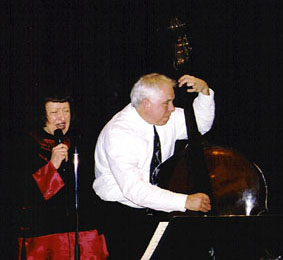 Next, the duo pulled out the obscure “Real Time” by a Portland,
Ore., vibes player, then paid tribute to the immortal dance team of Astaire
and Rogers with “Freddie and Ginger,” a medley of dance tunes ranging
from “Let’s Face the Music and Dance” and “Cheek to Cheek” to “I Won’t
Dance,” and “I Could Have Danced All Night.” Jordan again exhibited
her refreshing optimism with a bright reading of “Pick Yourself Up (Dust
Yourself Off and Start All Over Again).”
Next, the duo pulled out the obscure “Real Time” by a Portland,
Ore., vibes player, then paid tribute to the immortal dance team of Astaire
and Rogers with “Freddie and Ginger,” a medley of dance tunes ranging
from “Let’s Face the Music and Dance” and “Cheek to Cheek” to “I Won’t
Dance,” and “I Could Have Danced All Night.” Jordan again exhibited
her refreshing optimism with a bright reading of “Pick Yourself Up (Dust
Yourself Off and Start All Over Again).”
Despite her basically sweet nature, Jordan is not without
some stinging criticism of our president, his aggressive foreign policy and
his reckless disregard for international opinion. After noting how embarrassing
it was to be an American on a recent European tour, she dedicated
a ballad rendition of “On a Slow Boat to China” to George Bush Jr.
Inextricably bound to Charlie “Bird” Parker and his bop legacy,
Jordan tackled the difficult “Confirmation,” a Parker tune with lyrics
by Leroy Mitchell. Brown launched the affair with a bass solo before
Jordan entered the fray, singing, swinging and soaring like the alto
horn of “Bird” himself. The mood was light, lilting and playful.
Jordan chose Mal Waldron’s lovely “You” as a memorial to the
late pianist. As Brown provided the bass background, the singer told
a dark Waldron joke about a man who had just returned from the doctor
under instructions to take pills for the rest of his life. The man expressed
some doubt over the prognosis, saying, “He only gave me seven pills.”
Their rendition of “Blues Skies” demonstrated Jordan and Brown’s
understanding of the importance of silence and well-chosen spaces
between phrases. Brown was especially imaginative as he provided bass
fills. Miles Davis was given his due with “All Blues,” “Freddie Freeloader”
and “Now’s the Time,” which included a scatted vocal recreation of
the Miles trumpet solo on a classic Parker recording.
“Art Deco,” with lyrics by Jordan, was the duo’s homage to
another late, great trumpeter, the under-appreciated Don Cherry.
As she moved through these loving tributes to fallen jazz artists,
Jordan showed an unmistakable emotional connection. With touching honesty,
she said that “keeping the music alive is all I’ve really ever wanted
to do.”
Jordan and Brown didn’t neglect the classics of the great
American songbook, faithfully interpreting “Honeysuckle Rose,” “Ain’t Misbehavin’,”
“Mood Indigo” and “I Got Rhythm,” as well as Thelonious Monk’s “Rhythm-a-ning,”
Charles Mingus’ tribute to Lester Young entitled “Goodbye Pork Pie
Hat,” and “Good Morning Heartache,” dedicated to Billie Holiday. Jordan
invited members of the audience to scat along with her bop rendition
of “Embraceable You,” which she dedicated to the film “Bird” and director
Clint Eastwood.
Completing the astoundingly varied concert were the voice-and-bass
masterpieces “I’ve Grown Accustomed to the Bass,” “Sheila’s Blues”
and Jordan’s own take on Michel Legrand’s “You Must Believe in Spring,”
as she added, “You must believe in love, in you, in jazz.”
Jordan’s evident passion for the music is infectious, and
makes believers of everyone within earshot.
top
|
Concert Review
Brubeck tells history of jazz piano at Folly
|
By Tom Ineck
KANSAS CITY, MO.-Dave Brubeck, at age 82, possesses all the
skill and
range of experience needed to embody the history of the jazz
piano, and in his March 8 quartet performance at The Folly Theater
he recited that history in elegant detail.
![Dave Brubeck & Tom Ineck [Photo by Bev Rehkop]](media/brubeck.JPG) The current Brubeck quartet, also featuring alto saxophonist
Bobby Militello, bassist Michael Moore and drummer Randy Jones, is
the best since the classic foursome that included Paul Desmond, Eugene
Wright and Joe Morello. Their compatibility allows each soloist complete
confidence in his compatriots and creates a level of sophistication
that never falters. Though considerably older than his sidemen, Brubeck
treats them as equals and never dominates. The current Brubeck quartet, also featuring alto saxophonist
Bobby Militello, bassist Michael Moore and drummer Randy Jones, is
the best since the classic foursome that included Paul Desmond, Eugene
Wright and Joe Morello. Their compatibility allows each soloist complete
confidence in his compatriots and creates a level of sophistication
that never falters. Though considerably older than his sidemen, Brubeck
treats them as equals and never dominates.
Brubeck and company began with “On the Sunny Side of the Street,”
the same tune that launches its current CD, “Park Avenue South,”
recorded live last summer at a Starbucks coffee shop in New York
City. Militello’s sax warmed quickly to the mid-tempo swing and sway
of the melody, doubling the time in short, boppish bursts.
Moore, best known for his tenure with pianist Bill Evans,
delivered a lyrical solo. Brubeck’s solo contained several chapters from
the history of the piano, including a two-fisted stride technique deftly
accelerating in tempo and venturing briefly into the realm of the avant garde.
“The Nearness of You” received a beautiful reading from Militello,
switching from alto sax to flute. Moore also offered a lovely arco
solo.
Brubeck, feeling comfortable in the recently restored grandeur
of the historic Folly Theater, told his audience that the quartet
would be trying out some new material with them. On what the leader
described as a traveling blues, Militello burst forth with a hot alto
solo, bending notes and traversing the scales with effortless skill.
Moore again followed with a bowed bass statement on the mid-tempo number.
From a symphonic suite written for (and recorded with) the
Cincinnati Symphony and director Erich Kunzel, the Brubeck quartet
introduced a fast waltz that included some marvelous alto sax-piano
trades. Brubeck proved his versatility by moving on to a Latin tune,
with some spicy flute work by Militello, followed by the master in a
remarkable piano solo that reached to the very heart of the music.
Militello was the focus in a powerful, free alto performance
on an unnamed piece, which segued into an exchange between the alto
and drums, then to an astounding drum solo by Jones. Brubeck was in
his element with a lighting quick rendition of the Gershwin warhorse
“I Got Rhythm,” again featuring Militello’s hard-blowing, inventive
improvisations.
Brubeck’s lovely dirge, “Elegy,” was a moving duo for piano
and bass. The piece was written for Randi Hultin, a Norwegian journalist
who recently died of cancer. Paying tribute to the music of New Orleans,
Brubeck introduced his composition “Crescent City Stomp,” with Mardi
gras-style march rhythm and a tour de force alto solo.
Perhaps the showcase piece of the evening was Brubeck’s lengthy
“Don’t Forget Me,” beginning with a tender classical piano introduction
and moving into a mid-tempo waltz featuring Militello with a lilting
sax statement. Moore followed with a breath-taking bass solo, taken
up by Brubeck with supreme elegance as his fingers skittered gently over
the keys in fugue style. The tune eventually returned to the ballad tempo
and a scintillating summation by the composer.
To a spontaneous roar from the audience, the quartet kicked
off the Desmond-penned Brubeck standard “Take Five. Militello, never
one to mimic his predecessor, deconstructed the well-worn melody, quoting
from other Brubeck compositions and, at one point, reproducing the
sound of a siren, as though to call in the fire units to bring his blazing
performance under control. Jones’ drum solo tastefully recreated and
rhapsodized on the familiar 5/4 time signature, superimposing his own
alternative rhythm patterns on the classic structure.
With good-natured humor, Brubeck announced the finale, “Show
Me the Way to Go Home,” which also closes the live CD. Militello
on alto, Moore on bass and Brubeck on piano contributed soulful solos,
anchored by the solid drumming of Jones, to send everyone home with
a warm feeling.
top
|
Concert
Review
Saxophonists pay tribute to Bird in hometown
|
By Tom Ineck
KANSAS CITY, Mo.-Organizers of the 5th Annual Charlie Parker
Memorial
Concert on March 22 in Kansas City could not have asked for a more
appropriate group of musicians to celebrate the occasion than the Frank
Morgan-Sonny Fortune Quintet.
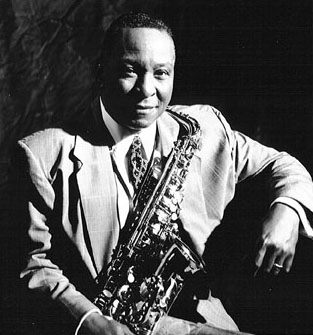 Although the two alto saxophonists bring much different influences
to their playing styles, they decided to assemble and co-lead a quintet
in homage to the legendary bop innovator for a two-week tour in March.
The tour included dates in Oakland and Santa Cruz, Calif., and St.
Paul, Minn., before the stop in Kansas City. The quintet completed
its brief run with performances in Albuquerque, N.M., and Hollywood. Although the two alto saxophonists bring much different influences
to their playing styles, they decided to assemble and co-lead a quintet
in homage to the legendary bop innovator for a two-week tour in March.
The tour included dates in Oakland and Santa Cruz, Calif., and St.
Paul, Minn., before the stop in Kansas City. The quintet completed
its brief run with performances in Albuquerque, N.M., and Hollywood.
Even more apt was the KC venue, the Gem Theater Cultural &
Performing Arts Center at 1601 E. 18th St., a recently restored 500-seat
performance hall. Along with the nearby American Jazz Museum, Negro
Leagues Baseball Museum and The Blue Room jazz club, it has been instrumental
in the revival of the historic 18th and Vine Street area, which spawned
Kansas City jazz in the 1920s and 1930s but had fallen into disrepair
in recent times.
The 69-year-old Morgan is a light and lyrical player in the
classic Parker mold, and despite a stroke that left him partially
paralyzed a few years ago, he still can sustain a strong melodic line
through the chord changes. The younger Fortune, 64, draws his sound
from the beefier, bluesy sound of John Coltrane, a reputation he earned
during his tenure with pianist McCoy Tyner in the early 1970s. Like Coltrane,
he’s also a Philadelphia native. The contrasting styles of the two horn
men created an exciting study in dynamics.
Bolstering the performances of Morgan and Fortune were the
combined harmonic and rhythmic instincts of pianist George Cables,
bassist Henry Franklin and drummer Steve Johns. Cables, especially,
was more collaborator than accompanist.
Parker’s “Confirmation” opened the proceedings with flair.
Morgan and Fortune played a unison lead line before taking separate
solos, leaving plenty of space for solos by Cables and Franklin. The
bassist’s searching, experimental phrasing was closer to Fortune’s
style than Morgan’s.
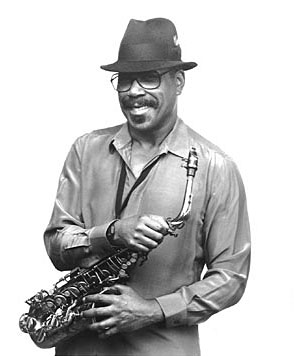 Paying tribute to another influential saxophonist, Fortune dominated
Wayne Shorter’s “Footprints” with his brawny, hard-edged sound, circular
breathing and powerful Trane-like phrasing. Morgan’s solo, by comparison,
was constructed from short staccato bursts, rather than Fortune’s
long, flowing lines. As though following Morgan’s lead, Cables’ brilliant
solo was both melodic and percussive. Finally, Morgan and Fortune traded
four-bar breaks in a fantastic display of virtuosity.
Paying tribute to another influential saxophonist, Fortune dominated
Wayne Shorter’s “Footprints” with his brawny, hard-edged sound, circular
breathing and powerful Trane-like phrasing. Morgan’s solo, by comparison,
was constructed from short staccato bursts, rather than Fortune’s
long, flowing lines. As though following Morgan’s lead, Cables’ brilliant
solo was both melodic and percussive. Finally, Morgan and Fortune traded
four-bar breaks in a fantastic display of virtuosity.
Slowing the pace for a ballad medley, Fortune turned his attention
to the standard “What’s New?” He gave it a lush reading, comparatively
faithful to its familiar melody. Cables got the spotlight for his
rendition of “Body and Soul,” which he concluded with a beautiful
keyboard coda. For his ballad feature, Morgan chose Cables’ “Helen’s
Song,” with he performed with the composer, adding a soaring alto sax
solo.
The two saxophonists reunited for “A Night in Tunisia,” with
Morgan stating the melody and Fortune taking the first solo, a swirling,
exhilarating improvisational journey. Morgan took the lead-off solo
on “All Blues,” delving deeply into the modal changes. Fortune proved
the more powerful soloist, taking 10 choruses of sustained brilliance.
top
|
Concert Review
Tenor titans ignite hall with concert
sizzler
|
By Tom Ineck
In the grand tradition of the jazz tenor saxophone battles
of yore, tenor giants
Don Menza and Pete Christlieb went head-to-head March 25 as guest
soloists with the Nebraska Jazz Orchestra.
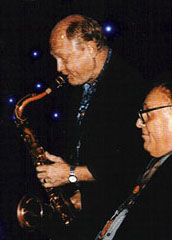 Menza and Christlieb, longtime friends and two of the most
popular studio musicians of the past 40 years, joined their horns
in immortal combat, raising the temperature level considerably for
the 400 listeners at The Cornhusker hotel ballroom. Menza and Christlieb, longtime friends and two of the most
popular studio musicians of the past 40 years, joined their horns
in immortal combat, raising the temperature level considerably for
the 400 listeners at The Cornhusker hotel ballroom.
Before the two guests took the stage, the NJO sax section
warmed up with a couple of tunes, including “Play It Again, Sammy,” a feature
for the saxophone section written for famed big-band composer-arranger Sammy
Nestico, and “Coastin’,” a mid-tempo swinger by Paul Baker that featured
brief, but effective statements by baritone saxophonist Scott Vicroy, trumpeter
Brad Obbink and bassist Andy Hall.
Menza and Christlieb hit the ground running with a brilliant,
blazing Menza arrangement of Ray Noble’s venerable flag-waver “Cherokee.”
After each of the tenor masters took a solo, they traded 4s, working
variations on the familiar theme from every angle and from the lower
registers to the upper range of their horns. Despite a sudden, offensive
electrical short in guitarist Pete Bouffard’s amp, the two kept focused
at breakneck speed.
“Nina Never Knew,” a ballad written for the Sauter-Finegan
band as a feature for trombonist Carl Fontana some 50 years ago,
featured Menza in his most romantic mood, playing a hard-edged tenor
in contrast with the light sound of clarinets, flutes and muted trombones.
From the extensive Menza songbook came “Groovin’ Hard,” an
irresistible, hard-charging tune first performed for a Munich radio
broadcast in the mid-1950s and later recorded by the Doc Severinsen,
Buddy Rich and Louis Bellson bands.
Christlieb’s solo was bluesy and imaginative, while Menza’s
began cautiously, building to a slow burn and finally igniting in
tenor pyrotechnics. Again the two brought the tune to a fiery climax
with extended trades. The Menza arrangement also featured the reed section
in a nice saxophone soli.
The orchestra began the second half of the concert with Menza’s
uptempo “Collage,” featuring fine solos by Darren Pettit on tenor
sax and Dave Sharp on alto sax. Rich Burrows struggled with miking
problems to deliver a tenor solo on Tom Kubis’ “Witchcraft.” Throughout
the evening, the sound-level inconsistencies of monitors, solo microphones
and the piano plagued the performance.
Menza and Christlieb rejoined the fray for Menza’s fast samba
called “Sambiana.” The two tenors stated the melody, took separate
solos, and then finished with traded passages as the band, driven
by drummer Greg Ahl, gathered momentum for the finale.
Christlieb took the spotlight for the Nestico arrangement
of Billy Strayhorn’s “Chelsea Bridge,” a recording that won the tenor player
a Grammy nomination earlier this year. His tone on the ballad standard
was big and breathy but had an angular attack that kept the listener’s
attention and prevented the performance from slipping into cliché.
Nothing could have followed the evening’s madcap capper, Menza’s
“Time Check,” an incredibly propulsive tune first waxed 30 years
ago by the Bellson band, in a recording featuring a younger Menza and
Christlieb. As Christlieb aptly noted before the duo dove into the
demonically difficult piece, “Playing this tune is like changing a
fan belt while the engine is running.”
It was an accurate description of the rhythmic tour de force,
which again had the tenor twosome taking hard-driving solos, including
a wry quote of “Summertime” by the comic Menza. A series of traded
horn statements followed, with Menza and Christlieb again acting like
a loving, long-married couple, finishing each other’s sentences in
a natural, flowing dialogue.
They finished with a dual cadenza that quoted “Blues Up and
Down,” the famous sax duet by Gene Ammons and Sonny Stitt. It was
a fitting conclusion to this good-natured battle of tenor titans.
top
Concert
Review
Old enough to drive,
Djangirov puts pedal to metal
|
By Tom Ineck
Once a year, the Nebraska Jazz Orchestra parades its Young
Lions All-Star Big
Band for all to see and hear, but never has the NJO had a
young lion who roared so loudly as its guest soloist Jan. 22 at The
Cornhusker hotel ballroom in Lincoln.
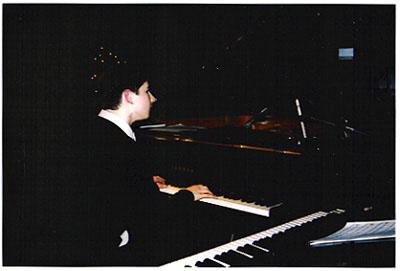 Now old enough to drive, the 16-year-old Eldar Djangirov drove
circles around his contemporaries. The young piano wizard from the
Kansas City, Mo., area was making his return appearance as guest soloist
with the orchestra, and it was everything that the capacity audience
of nearly 600 could have imagined. Now old enough to drive, the 16-year-old Eldar Djangirov drove
circles around his contemporaries. The young piano wizard from the
Kansas City, Mo., area was making his return appearance as guest soloist
with the orchestra, and it was everything that the capacity audience
of nearly 600 could have imagined.
The Young Lions, 15 hand-picked musicians from high schools
in Lincoln and Omaha, started things off with four tunes. As always,
the young hopefuls were more confident and more successful in the ensemble
passages that they were in improvised solos. Standout soloists included
saxophonists Alex Levitov, John Guittar and Elizabeth Love, all of
whom also were in last year’s all-star group.
They did a nice job on “Stella by Starlight” and the Dizzy
Gillespie piece “Soul Sauce,” but it was a special treat when their
visiting colleague Djangirov took the daunting piano role on “88 Basie
Street.” He played that role tastefully, as if holding back slightly
in the company of lesser mortals.
The NJO began its set with “Skank 7,” a reggae-influenced
tune utilizing seven-count measures. Music director Ed Love played the tenor
sax intro, leading into a nice brass statement that segued into a Love solo,
followed by Tom Harvill on piano and the Hammond electronic keyboard. Chick
Corea’s “Sea Journey” featured wonderful harmonies in the brass and a hearty
solo by Rich Burrows on tenor sax.
Djangirov returned for a variety of settings. First, he raced
through Juan Tizol’s “Caravan,” combining technical virtuosity with
audacity and supreme confidence, echoing the keyboard pyrotechnics
of Oscar Peterson or even Art Tatum in his rolling left-hand figures
and his lightning-swift right hand.
With bassist Andy Hall and drummer Carlos Figueroa, Djangirov
expertly performed the Miles Davis blues “Freddie Freeloader” and
the ballad “You Don’t Know What Love Is.” He reached heights of astounding
speed and improvisational prowess on a solo rendition of Wayne Shorter’s
“Footprints.”
After this amazing display of Djangirov’s keyboard accomplishment,
the members of the NJO meekly returned to the stage, but immediately
proved themselves equal to the task with the uptempo workout “Pressure
Cooker.” Djangirov stayed out of the spotlight for much of this tune
and the next one, “Thelonious Assault,” a reinterpretation of Thelonious
Monk’s “Well You Needn’t.”
It was the finale that proved most impressive. Gershwin’s
“I Got Rhythm” has been done in many different styles, but none like this
Rob McConnell arrangement with the brass section setting the furious pace
and Djangirov exploding into an incredible solo.
His standing ovation was richly deserved.
top
Concert Review
Gulizia helps NJO remember
Sinatra, Basie |
By Tom Ineck
The Nebraska Jazz Orchestra’s decision to salute Count Basie
and Frank
Sinatra in the season finale may not seem an obvious choice,
but the two legends of American popular song had much in common.
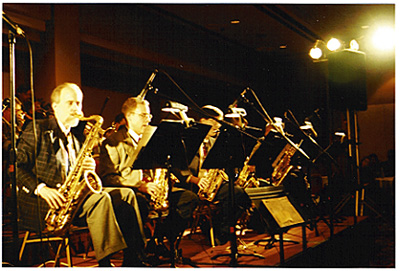 Sinatra and Basie made two studio recordings together and
collaborated on the classic “Sinatra at the Sands” live performance
in 1966. They swaggered with equal confidence and had a natural rapport,
much like the teaming May 6 at The Cornhusker hotel. Sinatra and Basie made two studio recordings together and
collaborated on the classic “Sinatra at the Sands” live performance
in 1966. They swaggered with equal confidence and had a natural rapport,
much like the teaming May 6 at The Cornhusker hotel.
Guest vocalist Tony Gulizia, an Omaha native now living in
Vail, Colo., has a longtime association with several members of the
NJO, including music director Ed Love. Gulizia also has that Sinatra
panache, that charismatic hipster charm. As a friend observed, he has
that “nouveau Rat Pack thing.”
Following a snippet of the Basie theme song, “One O’Clock
Jump,” the NJO began the concert in earnest with the Basie-style riffing
of “Count Bubba” by Gordon Goodwin, warming up each horn section separately.
The long piece also included individual solos by trumpeter Bob Krueger,
trombonist Pete Madsen, guitarist Peter Bouffard and Love on alto sax.
Trombonist Tommy van den Berg, a senior at Lincoln Southeast
High School and this year’s Young Jazz Artist, was featured in an
opening set. Van den Berg handled the changes nicely on the mid-tempo
Dave Sharp arrangement of “Then End of a Love Affair,” but really excelled
on Sonny Rollins’ rollicking “St. Thomas,” with a small combo consisting
of piano, guitar, bass, drums and percussion. Tom Harvill’s lively
piano solo captured the irrepressible joy of the calypso rhythm. Van
den Berg also sounded confident on the minor-key blues shuffle “A Switch
in Time,” written by Sammy Nestico for the Basie band.
Gulizia began with “Teach Me Tonight,” displaying his sure
sense of vocal dynamics and a personal way of phrasing the lyrics.
In “The Lady is a Tramp,” he cleverly mimicked Ol’ Blue Eyes with casual
lyric changes, substituting “girls” with “broads.”
From the Stan Kenton songbook came the Bill Holman tune “Cubajazz,”
as though specially chosen for the evening’s extra percussion players,
including Gulizia’s younger brother, Joey, on bongos and surprise guest
Doug Hinrichs on congas.
A wonderful musician who is also adept on the piano and organ
keyboards, singer Tony Gulizia showed an impeccable sense of timing
on “Fly Me to the Moon.” As if to remind Gulizia of his more modest and
more ethnic musical roots, Love brought out an accordion, on which Gulizia
good-naturedly played “The Chicken Polka,” to the delight of orchestra
members and the audience of 400.
Back to business, Gulizia switched to Gershwin, singing a
Dave Sharp arrangement of “Summertime” in samba time. Brother Joey
added congas and Jeff Patton soared on a spirited trumpet solo. Moving
to the piano, Gulizia led a quartet featuring guitarist Peter Bouffard,
bassist Andy Hall and percussionist Joey Gulizia for one of the highlights
of the evening, a lovely rendition of Dori Caymmi’s “Like a Lover,” best
known as a Sergio Mendes hit in the late 1960s.
The quartet continued with “In the Wee Small Hours of the
Morning,” with Gulizia diving immediately into the lyric with little
introduction. He showed his two-fisted, driving piano style on the
fast-paced “I Love Being Here with You.”
A Quincy Jones arrangement of “I’ve Got You Under My Skin”
completed the regular concert program, but Gulizia returned for a
well-received encore on “Every Day (I Have the Blues),” in the style
of Basie and singer Joe Williams.top
Concert Review
McNeil quartet gives seamless
performance
|
By Tom Ineck
No one could ever accuse the John McNeil Quartet of playing
clichés.
With few comments from the leader regarding the title or
the inspiration behind each tune, the band’s two-hour performance
Jan. 31 at Kimball Recital Hall in Lincoln flowed seamlessly, as though
creating a symphonic suite or simply an extended conversation among
four confidants. But none of the melodies, chord changes or improvised
solos could be described as predictable.
McNeil is a trumpeter, composer and band leader worthy of
far more recognition than he has acquired in his 54 years. While leading
a quartet since 1979, and the current lineup since 1997, McNeil has
developed a rare rapport with his sidemen: guitarist Andrew Green, bassist
Tom Hubbard and drummer Ron Vincent, who last performed in Lincoln as timekeeper
for baritone saxophone legend Gerry Mulligan in the early 1990s.
The midtempo opener seemed to come out of left field, with
a brief statement of the melody followed by a subtle, searching guitar
solo alternating chords and single-note runs. McNeil’s trumpet solo
soared freely while staying narrowly and imaginatively within the chord
changes.
An uptempo stop-time piece metamorphosed into another tune,
with Green’s jagged, hard-edged guitar solo demanding attention. His
tasteful use of effects (assorted slides, volume pedal, finger-tapping
and hammer-on techniques among them) never got in the way and always
added color to the overall sound.
The same can be said of Hubbard’s warm tone and perfect intonation,
whether plucking or bowing the bass, and of Vincent’s bag of tricks,
which included tambourine, chimes, mallets and other percussion paraphernalia.
Exhibiting a well-paced sense of dynamics, the quartet moved
gracefully through a ballad, featuring a guitar solo of restrained
virtuosity. After Green and the rhythm section had created an exotic
Eastern mood, McNeil entered with an extraordinary solo, as though adding
his own comments to the conversation.
Using a large shot glass as a slide on the strings, Green
created an eerie effect, playing a quavering unison line with McNeil
on trumpet.
The one recognizable melody all night was “Nothing Like You,”
an obscure tune written by singer Bob Dorough for an otherwise instrumental
Miles Davis recording session. McNeil gave it an aptly quirky reading.
In an intriguing departure from the jazz norm, the quartet
performed McNeil’s composition “Urban Legend,” a tune whose rather
conventional folk-rock sentiment contrasted dramatically with McNeil’s
“outside” trumpet statements.
With “Blue Boat,” McNeil and company demonstrated their affinity
for the blues, albeit a very odd sort of blues progression. It is
unlikely that anyone in the audience of 300 could have hummed along
with these fast and furious changes.
top
Friends of Jazz
Bob Popek is a musician's best friend
|
By Tom Ineck
On most days, you can find Bob Popek hunkered down in the back
room of the
third floor at Dietze Music House in downtown Lincoln, surrounded
by the well-worn tools of his essential trade. He’s a string musician’s
best friend.
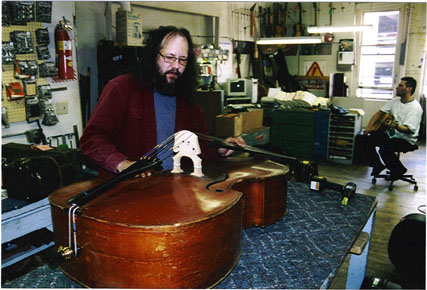 For more than 25 years, Popek has been an instrument repairman,
capable of returning life and harmony to the most dejected and abused
of guitars, banjos, fiddles, mandolins, basses. Generations of rock,
folk, bluegrass, jazz and classical string players have Popek to thank. For more than 25 years, Popek has been an instrument repairman,
capable of returning life and harmony to the most dejected and abused
of guitars, banjos, fiddles, mandolins, basses. Generations of rock,
folk, bluegrass, jazz and classical string players have Popek to thank.
“What I realized, very early on, is that people are very attached
to their instruments, and they want them to play the way they want them
to play,” Popek said. “And, no two people play alike.”
He began by specializing in instrument adjustments and custom
guitar setups, the basic configuration of the instrument’s strings and
fretboard. Then, he added a one-year warranty on all of his work.
“That was totally unheard of back then, because an instrument’s
made out of wood and it shifts. But, I needed to make a statement when
I started. I was pretty gung-ho.” Popek quickly became known as the “setup
king,” which earned him many longtime friends among local string benders
and fret meisters.
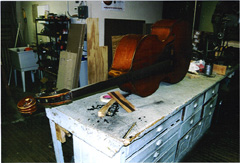 One of his current projects is restoring a double bass, vintage
circa 1890, which
once belonged to his mentor, the late bassist and string repairman
Mark Pierce, who was in his 90s when he died in the mid-1970s, after
running the Dietze repair shop for many years. In storage for 30 years,
the bass was only recently purchased by the store for restoration. One of his current projects is restoring a double bass, vintage
circa 1890, which
once belonged to his mentor, the late bassist and string repairman
Mark Pierce, who was in his 90s when he died in the mid-1970s, after
running the Dietze repair shop for many years. In storage for 30 years,
the bass was only recently purchased by the store for restoration.
“When I found out it was Mark Pierce’s, with the connections,
I thought it was too important to let that go on and lose the history
it had, that I had to buy it and restore it and use it for a better cause,”
Popek said.
When brought back to playing condition in Popek’s skilled hands,
the bass will be made available for visiting bassists who have to
leave their instruments at home, an increasingly common situation
when air travel is a dicey proposition. Already the carved instrument,
which will be valued at $5,000 when finished, is scheduled for play
during three of this year’s Jazz in June concerts in Lincoln.
Popek began his association with Dietze as a guitar teacher
in 1976. Within six months, he was helping out in sales and landed a
part-time job with Pierce in the repair shop, in addition to teaching.
Pierce was doing orchestral string repair—basses, cellos, violas and violins.
“Mark Pierce taught me the practical side of repair, realistically
what you saw in life,” Popek said. “A lot of things aren’t pretty.
When somebody falls with a bass—no two people fall alike.”
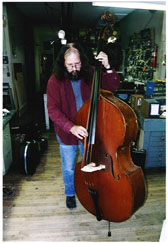 Pierce, however, didn’t have time to teach his young apprentice
everything. Pierce, however, didn’t have time to teach his young apprentice
everything.
“I worked with him for about a year, until we realized that
Mark wasn’t going to be around much longer.” Dietze sent Popek to a repair
school in Minnesota for a year of formal training that would groom him
to replace Pierce, who died while Popek was away. Because Popek was the
first student sponsored by a music store, he was treated with special care,
to raise the school’s placement rate and to set an example for other stores.
When he returned to Lincoln, he was ready.
“We had enough work back then for it to be a good, solid part-time
job, and it took maybe four or five years to build up to where I couldn’t
keep up, and we slowly started to hire, to evolve.” The repair operation
now includes Popek, two fulltime assistants in downtown Lincoln, one
fulltime repairman at the south Lincoln store and one at the Omaha location.
He credits local bassist and UNL Associate Professor Rusty
White with helping him to broaden his skills into other areas, such
as perfecting setups for string basses, building his own adjustable
bridges and designing his own C-string extensions.“More than 20 years
ago, when he first came to town, he came into the shop and said, ‘Bob,
I’ve seen your work and you do OK, but you’re going to do better,’” Popek
recalled. “I told him, ‘Tell me what you expect, and I’ll try to meet it,’
so he was a very heavy influence on me.”
The first music store in Lincoln to offer full service on all
instruments sold, Dietze can handle anything that comes through the
door, from acoustic string instruments to brass, from drums to electric
keyboards and amplifiers. With the closing of other Lincoln area music
stores and Dietze’s solid regional reputation, business continues to grow.
“We’re doing work with the Omaha Symphony. I do work, on a
regular basis, as far west as Grand Island. I have regular customers
as far away as Denver, Kansas City and Minnesota. We’ve diversified
quite a bit. We’re not a shop to limit ourselves to certain things.
It’s not a surprise to walk up into the shop and see a grand piano standing
in what might be our last available place to stand because somebody wanted
a piano refinished. We won’t turn anything down.”
Just the string family alone is a prolific one, including mandolin,
guitar, banjo, steel guitar, bass, violin, viola and cello, not to mention
such second and third cousins as the ukulele, zither and dulcimer.
“You can think of a thousand differences in each instrument,
but there are just as many similarities,” Popek noted. “They all require
the same mechanism to tighten the string. They all require a string,
a sound box and a neck to perform on.”
Popek also works with manufacturers to create improvements
in instruments and accessories. For example, he helped to solve a design
problem on a string bender that could bend one or two strings independently.
He also devised a display model guitar that allows customers to test different
pickups before they make a purchase.
What truly tests the repairman’s knowledge and skill is restoring
a vintage instrument to its former glory.
“With restoration, you want to try to keep with the theme that
the instrument was built in, in its time. A lot of lost knowledge
you need at your fingertips to do a job correctly.” In recent years,
the Internet has become an invaluable tool for Popek in his search
to access the history of instruments and the knowledge of instrument
repairmen worldwide.
top
Berman guitar gets tender
loving care
|
By Tom Ineck
Like most dedicated musicians, Butch Berman’s relationship
with his instruments
is close. He’s especially close to his 1961 Fender Esquire, and
when it comes to repairs and
maintenance of this classic axe, he turns it over to Bob Popek at
Dietze Music House (Popek is featured in a Friends of Jazz article
above).
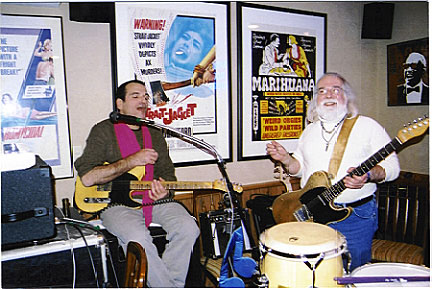 Berman recently related the story of his guitar and the man
who keeps it humming. It began in the mid-1970s. Berman recently related the story of his guitar and the man
who keeps it humming. It began in the mid-1970s.
“When the Megatones broke up, we were looking for a guitar
player. We tried a bunch of different things, and nothing really clicked.”
Berman, a piano player with the Megatones, also played occasional
guitar, so he offered his services.
“It worked, but I didn’t have a guitar. At the time, Charlie
had this really cool guitar, so he sold me his ’61 Fender Esquire.
It’s a great guitar. So, I started using this guitar a lot. Like a sports
car, it needs maintenance. I’d always been hanging around Dietze, and
somehow I met Popek.”
Berman told Popek he was having problems with guitar, and took
the instrument to Dietze’s third-floor repair shop. The skilled craftsman
saw the guitar’s value and potential. He also understood exactly how
Berman wanted it to play and sound. Popek has been the instrument’s
“caregiver” ever since.
“Over the years, probably about every season, I take my guitars
into him and he strums it and checks it out, changes the strings and
repairs it. I used to have a problem with breaking strings and tuning,
and now I hardly ever break a string or go out of tune. He’s been the
man for all my stringed instruments ever since that day. He really has
an understanding. He’s a real talented guy.”
top
Tomfoolery
Thompson applies
tourniquet to the soul
|
By Tom Ineck
HASTINGS, Neb.—English trad-rock apothecary Richard Thompson
arrived
April 23 at Hastings College carrying an old kit bag of tricks
filled to the brim.
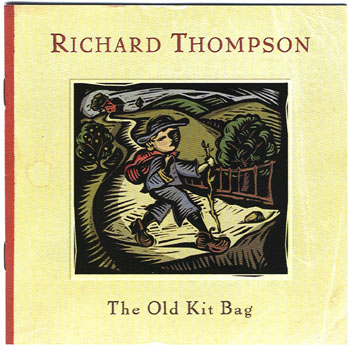 As promised in the subtitle of his new CD, “The Old Kit Bag,”
the concert of largely new material contained “unguents, fig leaves
and tourniquets for the soul.” On the rare occasion of a Thompson electric
band tour of America’s heartland, the quartet’s inspired performance for
some 650 people at French Memorial Chapel did, indeed, have welcomed healing
powers. As promised in the subtitle of his new CD, “The Old Kit Bag,”
the concert of largely new material contained “unguents, fig leaves
and tourniquets for the soul.” On the rare occasion of a Thompson electric
band tour of America’s heartland, the quartet’s inspired performance for
some 650 people at French Memorial Chapel did, indeed, have welcomed healing
powers.
The band was one of the best I’ve seen since my first encounter
with Thompson in 1985 at Parody Hall in Kansas City, on the heels of
the “Across a Crowded Room” release. The common denominator of both concerts
was bassist Rauri McFarlane, then making his first U.S. visit, but now
a seasoned veteran on both electric and upright bass. Multi-instrumentalist
and harmony singer Pete Zorn, a long-time Thompson road warrior, and Earl
Harvin, an outstanding percussionist from Dallas, gave the foursome a
tight, self-contained sound, like a well-oiled machine.
“The Old Kit Bag” seems, at once, more accessible melodically
and more complex lyrically than many of his recent releases. As a composer,
Thompson has never avoided the tough subjects of life, love, faith and
death, but his new writing is especially pointed. A devout Sufi Muslim,
he has undoubtedly been affected by the world’s sordid events of the
recent past.
Unexpectedly, Thompson immediately launched into the rocker
“Tear-Stained Letter,” a classic flag-waver that usually is held in
reserve for later in the show. He followed with several tunes from the
new CD, beginning with “Gethsemane,” a meditation on the meaning of life
concluding with the question: “Who sucked out the freedom, days without
end? Under the weight of it all you must bend.”
The rocker “Pearly Jim” was followed by “Outside of the Inside,”
a scalding attack on the self-righteousness of the religious right.
It begins, “God never listened to Charlie Parker. Charlie Parker lived
in vain. Blasphemer, womanizer, let a needle numb his brain. Wash away
his monkey music. Damn his demons, damn his pain.” McFarlane’s booming
acoustic bass contrasted dramatically with Harvin’s sharp rat-a-tat-tat
on the bongos.
From the past came “Razor Dance” and the heart-wrenching “Missie
How You Let Me Down,” featuring Zorn on alto flute. Zorn switched
to soprano sax for a heavenly rendition of “Al Bowlly’s in Heaven,”
with Thompson on acoustic guitar and Harvin displaying his subtle but
effective brush technique.
Returning to his new material, Thompson played a solo acoustic
guitar version of “A Love You Can’t Survive.” As if to flaunt his versatility,
he then performed (in Italian) his rocking arrangement of “So Ben Mi
Ca Bon Tempo,” written circa 1600 by Orazio Vecchi. By the way, the U.S.
release of “Kit Bag” contains a limited-edition bonus disc containing
an acoustic live version of this tune, Prince’s “Kiss,” and a video clip
from a BBC documentary on Thompson.
“One Door Opens” had the feel of a traditional dance number,
with acoustic guitar, mandolin, acoustic bass and bongos setting the
mood. After the rocking “I’ll Tag Along,” Thompson again dipped into
his considerable back catalog for “Bank Vault in Heaven,” “I Want to
See the Bright Lights Tonight” and “Shoot out the Lights.”
“She Said It Was Destiny” was another finger-snapping melody
from “Kit Bag.” A very fast rendition of the favorite “Two Left Feet”
was followed by the evening’s only extended jam, on the breath-taking
finale “You Can’t Win.”
The crowd brought the boys back for two encores, beginning
with a solo acoustic “1952 Vincent Black Lightning,” “Wall of Death”
and “Crawl Back (Under My Stone).” For the second encore, they brought
out “Man In Need” and finished with two new tunes, “Jealous Words” and
“Word Unspoken, Sight Unseen.”
Ever the professional, Thompson and the band played a generous
23 tunes, including 10 from the new release (counting the Italian novelty).
Thompson fans, a famously obsessed clan of followers, have
kindred spirit Turner McGehee and the Hastings College Artist Lecture
Series to thank for making possible this free concert appearance.
top
Concert Review
Jerry Seinfeld improvises like jazz saxist
|
By Butch Berman
DES MOINES, Iowa-Jerry Seinfeld—jazz? Yeah, why not? Improvisation
is the
ability (I know, Jamey Abersold sez everyone can improvise,
but you know what I mean) to alter the original arranged piece of material,
whether it be musical or spoken word. Well, I tell ya—after witnessing
Jerry Seinfeld’s new stand-up concert Jan. 21 at the Des Moines, Iowa,
Civic Center’s sold-out second show, I could easily draw the comparison.
 Dig this. The parallels between a sax player’s own personal
take on whatever composition he is blowing—and keeping (sometimes, ever
so slightly) the intended tune intact and Jerry’s shtick shows that he
obviously has a game plan. There were several times I second-guessed what
current hot topic he would put his spin on next, yet his relaxed, but slightly
smug demeanor, almost took me back to the old Jack Benny days. His timing,
like a veteran musician, was and is and probably will always be flawless. Dig this. The parallels between a sax player’s own personal
take on whatever composition he is blowing—and keeping (sometimes, ever
so slightly) the intended tune intact and Jerry’s shtick shows that he
obviously has a game plan. There were several times I second-guessed what
current hot topic he would put his spin on next, yet his relaxed, but slightly
smug demeanor, almost took me back to the old Jack Benny days. His timing,
like a veteran musician, was and is and probably will always be flawless.
After his opening act (I can’t remember his name, but he was
a pretty damned good standupper who really got the pro-Jerry audience
primed) the lights dimmed as Jerry creeped on the bare stage, except
for his lone barstool, glass of water and mike to one of the most heartfelt
standing Os before he even opened his mouth I’ve ever seen. It gave me
a rush I’ll always remember.
Obviously, everyone in the audience, including myself, lived
and breathed for Jerry, as well as his daily reruns. His only faux
pas, which I’ve experienced at the two previous shows I’ve seen him perform
at, was his attempt to use the audience in a question-and-answer session
for his encore. It might work in a super-hip venue like L.A. or New York,
but the people he picked out of the Lincoln, Omaha and Des Moines audiences
proved to be fairly mundane. Yet, he takes his chances with that, and
the trouper he is makes it sorta work.
With “The Sopranos” and “Sex in the City” in their last season,
please come back, Jerry! You’re the best… the best, Jerry!
top
DVD Review
Funk Brothers story makes life-shaking DVD
|
By Butch Berman
If you’re lucky, and live long enough, a few major incidents
will probably take
place to shake and/or shape our lives.
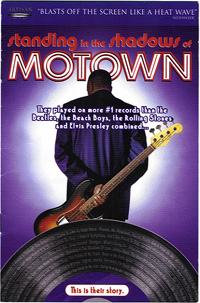 Looking back, I recall being home on furlough from Wentworth
Military Academy (WMA) at the ripe age of 16 and seeing Dylan in ’65.
His first set was solo, followed by (at the time) the loudest, in-your-face
backup band I’ve ever heard. Looking back, I recall being home on furlough from Wentworth
Military Academy (WMA) at the ripe age of 16 and seeing Dylan in ’65.
His first set was solo, followed by (at the time) the loudest, in-your-face
backup band I’ve ever heard.
Next, also while at WMA in 1968, I snuck out, ingested my first
LSD and saw Jimi Hendrix live in Kansas City. Lastly, catching Gerry
Mulligan, months before his untimely death, inspired me to embrace jazz
as never before, and to co-found the Berman Music Foundation with my then-partner,
Susan Berlowitz. These are three standouts that first came to mind.
Yesterday…I had another. A full-page ad in Entertainment Weekly
sent me on a search to Barnes and Noble. A nervous, near frantic hunt
finally proved fruitful. VOILA! I’m now holding the new DVD entitled,
“Standing In the Shadows of Motown,” inspired by author and educator Alan
Slutskey and director Paul Justman. This is the story of the self-penned
Funk Brothers, who from 1959 to the early 70’s provided the back-up and
rhythm sections for Berry Gordy and Motown Records. The Funk Brothers
did make a fairly decent living, but were certainly not overpaid and were
left fairly obscure and unheralded. Motown made a fortune from these incredible
musicians, turning dozens of talented singer/songwriters into stars, and
recording hundreds of hits. Hey, I had every 45 from this era, and outside
of bassist James Jamerson, I hadn’t known the names of any of these cats.
So please, from now on remember these names: Drummers William
“Papa Zita” Benjamin, Richard “Pistol” Allen and Uriel Jones; bassists
James “Igor” Jamerson and Bob Babbit; guitarists Robert White, Eddie “Chank”
Willis and Joe Messina; pianists Joe Hunter, Earl: Chunk of Funk” Van
Dyke and Johnny Griffith; percussionist Eddie “Bongo” Brown and vibe-player/tambourine
specialist Jack “Black Jack” Ashford, they comprise the heart and soul
brotherhood of funk.
While researching a book on the Motown bass phenom James Jamerson…a
visit to his widow turned author Slutsman’s project into a 15-year odyssey
to finish this film while these men were still healthy enough to appreciate
their long over due adulation. Sadly, six of these gentlemen have
since passed, but this work of art is God sent. Truly a spiritual experience,
as countless educational gifts lie within this two DVD set. Almost life-changing,
the packaging is as well done as I’ve ever seen, and I’ve seen a lot.
Grab it, open your hearts, dance the night away and rejoice.
The Funk Brothers are back again…encased forever in a box set worth
building a shrine for.
top
Colorado correspondent enjoys Rocky Mountain Hi (Fi)
|
By Dan Demuth
Ed Polcer brought “The Magic of Swing Street” to Colorado Springs
on Feb.
19, musically recreating the period from the early ‘30s to
the late ‘40s of New York’s famed 52nd Street—a street that Arnold
Shaw titled his book as “The Street that Never Slept.”
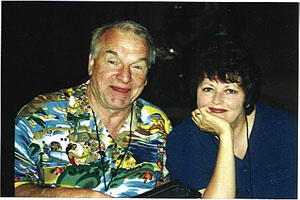 Accompanying cornetist Polcer was Alan Vache on clarinet, Dan
Barrett on trombone, bassist Frank Tate, John Cocuzzi handling the piano
and vices and Joe Ascione on drums. My notes will concentrate more on
the event rather than the ritualistic listing of the songs played and
comments on each. Reminiscent of a club-size atmosphere, an appreciative
crowd of just under 200 people comfortably filled this venue at the Red
Lion hotel. Accompanying cornetist Polcer was Alan Vache on clarinet, Dan
Barrett on trombone, bassist Frank Tate, John Cocuzzi handling the piano
and vices and Joe Ascione on drums. My notes will concentrate more on
the event rather than the ritualistic listing of the songs played and
comments on each. Reminiscent of a club-size atmosphere, an appreciative
crowd of just under 200 people comfortably filled this venue at the Red
Lion hotel.
Ed Polcer has the too oft-unseen ability to create a comfortable
mood, as if one were conversing with him in your living room. It was
obvious the musicians were also comfortable in this mode, it reflects
in their playing and the mood resonates with the audience. The selections
were what one could have heard on The Street, perhaps mistakenly too often
put into a back as “traditional” by those who don’t care to really venture
outside of their cozy but limited sphere. As Shaw notes, Basie, Hawkins,
Gillespie, Goodman, Herman, Parker, Vaughan, Tatum, Garner, Holiday, (Artie)
Shaw, Norvo and Shearing were but a very few of the habitués of
the 30-odd establishments nestled in an area of less than two blocks on
The Street. If that’s traditional, I’ll have some. I would prefer to categorize
this jazz as timeless.
To name just a few of the performance highlights: Vache’s beautiful
solo performance of “Danny Boy;” Barrett displaying his skill on the
88s; Polcer’s intuitive comments; the “just right” touch on all numbers
by Ascione and Tate; and Cocuzzi playing “intermission” piano, doing bluesy
vocals on “I Want a Little Girl” and “Hello Central, Give me Dr. Jazz.”
A conversation with Polcer validated my thought that Harry “The Hipster”
Gibson was perhaps the epitome of the many intermission pianists who earned
their bread on 52nd Street.
All of the musicians lingered afterwards to talk with anyone
who wanted to, another nice touch. This event was sponsored by the
Pike’s Peak Jazz & Swing Society. While on tour, two weeks prior to coming to the Springs,
Polcer’s group stopped in a studio in Durham, N.C., and recorded an
11-track CD—“Let’s Hit It!”—in one day, no rehearsals, no kiddin’.
It’s great.
top
Editor’s Note: At your request,
we will mail a printed version of the newsletter. The online newsletter
also is available at this website in pdf format for printing. Just click
here: Newsletter
|


![Norman Hedman [Photo by Rich Hoover]](media/hedman1.jpg) Percussionist Norman Hedman, a longtime friend, consultant
and associate of
the BMF, has appeared in the Jazz in June
lineup before, but this time his New York City-based tropical jazz
group, Tropique, will feature a slightly different lineup of players.
Hedman’s combo plays an engaging blend of warm-climate dance rhythms,
including salsa, Latin jazz, bomba and samba. A world-class conguero,
Hedman has a percussion style influenced by Cal Tjader and Armando Peraza.
The BMF is the chief sponsor of this concert.
Percussionist Norman Hedman, a longtime friend, consultant
and associate of
the BMF, has appeared in the Jazz in June
lineup before, but this time his New York City-based tropical jazz
group, Tropique, will feature a slightly different lineup of players.
Hedman’s combo plays an engaging blend of warm-climate dance rhythms,
including salsa, Latin jazz, bomba and samba. A world-class conguero,
Hedman has a percussion style influenced by Cal Tjader and Armando Peraza.
The BMF is the chief sponsor of this concert. Sinatra and Basie made two studio recordings together and
collaborated on the classic “Sinatra at the Sands” live performance
in 1966. They swaggered with equal confidence and had a natural rapport,
much like the teaming May 6 at The Cornhusker hotel.
Sinatra and Basie made two studio recordings together and
collaborated on the classic “Sinatra at the Sands” live performance
in 1966. They swaggered with equal confidence and had a natural rapport,
much like the teaming May 6 at The Cornhusker hotel. One of his current projects is restoring a double bass, vintage
circa 1890, which
once belonged to his mentor, the late bassist and string repairman
Mark Pierce, who was in his 90s when he died in the mid-1970s, after
running the Dietze repair shop for many years. In storage for 30 years,
the bass was only recently purchased by the store for restoration.
One of his current projects is restoring a double bass, vintage
circa 1890, which
once belonged to his mentor, the late bassist and string repairman
Mark Pierce, who was in his 90s when he died in the mid-1970s, after
running the Dietze repair shop for many years. In storage for 30 years,
the bass was only recently purchased by the store for restoration. Dig this. The parallels between a sax player’s own personal
take on whatever composition he is blowing—and keeping (sometimes, ever
so slightly) the intended tune intact and Jerry’s shtick shows that he
obviously has a game plan. There were several times I second-guessed what
current hot topic he would put his spin on next, yet his relaxed, but slightly
smug demeanor, almost took me back to the old Jack Benny days. His timing,
like a veteran musician, was and is and probably will always be flawless.
Dig this. The parallels between a sax player’s own personal
take on whatever composition he is blowing—and keeping (sometimes, ever
so slightly) the intended tune intact and Jerry’s shtick shows that he
obviously has a game plan. There were several times I second-guessed what
current hot topic he would put his spin on next, yet his relaxed, but slightly
smug demeanor, almost took me back to the old Jack Benny days. His timing,
like a veteran musician, was and is and probably will always be flawless. Looking back, I recall being home on furlough from Wentworth
Military Academy (WMA) at the ripe age of 16 and seeing Dylan in ’65.
His first set was solo, followed by (at the time) the loudest, in-your-face
backup band I’ve ever heard.
Looking back, I recall being home on furlough from Wentworth
Military Academy (WMA) at the ripe age of 16 and seeing Dylan in ’65.
His first set was solo, followed by (at the time) the loudest, in-your-face
backup band I’ve ever heard.